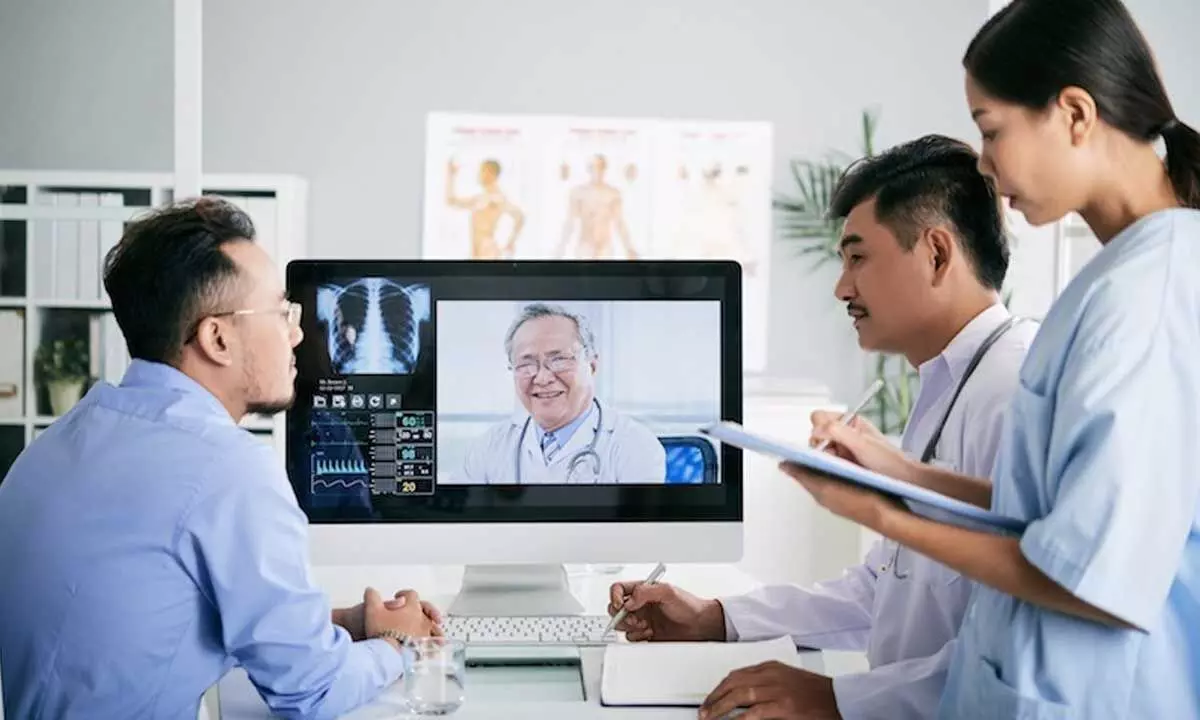How 5G can be a game changer for pharma, healthcare industry
It will enable emerging promising technologies to unleash their full potential through the speed and low latency being offered by 5G
image for illustrative purpose

The major benefits anticipated include reliable connections for critical healthcare services with the very low end-to-end latency and ultra-reliable communications proving essential to the provision of instant communication regarding patients' conditions – through HD images and access to medical records – and provide accurate feeling and tactile interaction in the case of remote surgical procedures
Recently, there were reports that Apollo Hospitals, in association with Bharti Airtel, has carried out India's first 5G driven, Artificial Intelligence (AI) guided colonoscopy trial. The trial was conducted using AI on Airtel's 5G technology with ultra-low latency and high processing capabilities as a result of which the colon cancer got detected much faster and with greater accuracy. HealthNet Global, AWS and Avesha were the other three companies that collaborated in this trial. As a result of AI guided colonoscopy procedure, the image processing happened in real time without any lag even when the physician moved the scope through the colon for it to be overlaid on top of the right element of the colon. The advent of this technology enabled an 'extra pair of eyes' for physicians and improves the detection rate of polyps, thus saving lives and vastly improving patient care.
AI assisted Colonoscopy Polyp Detection trial will help doctors to improve quality of patient care, improve accuracy of detection rates by capturing information correctly and reducing errors. 5G, Edge computing and Artificial Intelligence can significantly improve patient outcomes by assisting in proper and timely diagnoses. As per current protocol, colon cancer is detected through colonoscopy procedure which is manual and requires great attention and time from medical practitioners for accurate detection. Currently, the procedure is performed using a device comprising of flexible tube with light, camera and tools at one end, which are used to extract samples to identify an infected polyp. Not only is the procedure long, it is discomforting for patients and for the doctors and nurses who perform the procedure which takes around 30 to 40 minutes.
Of course, 5G is indispensable and it is the future. It is a fact that the Covid pandemic has been a force multiplier in the adoption of digital technology at scale. Although the pharmaceutical sector in India has been slow to respond to digital technology except the pharmacy retail sector that was the first to go for it, 5G is now gaining ground as world over 86 to 90 of the clinical studies have opted to take the digital pathway. This will help upgrade the drug discovery and clinical trials space. The human studies could be shifted from trial sites to homes with constant and close monitoring on patient outcome with the new drugs administered. It will convert chaos of managing data to intelligent information about patient response. It will also upgrade the lab sensor technology.
To this end, pharma industry in the country will engage and adopt the required guidance framework to embrace 5G. The roll out of 5G services starting from the major cities in the country will benefit each of the key participants in the healthcare value chain, from the healthcare providers to the patients and the medical devices industry. 5G which is currently available only in some cities will be available at least across 100 cities by February 2023. The major benefits anticipated include reliable connections for critical healthcare services with the very low end-to-end latency and ultra-reliable communications proving essential to the provision of instant communication regarding patients' conditions – through HD images and access to medical records – and provide accurate feeling and tactile interaction in the case of remote surgical procedures. 5G will facilitate precision medicine, online consultations and applications to monitor health and administer medication remotely to better manage chronic ailments. The capabilities of 5G create new access pathways for doctors and healthcare workers, including a renewed focus on better technology usage and delivering the full potential of 5G.
5G technology is long awaited because it has the potential to overcome several key challenges confronting the healthcare industry. It has the potential to help businesses leverage the full potential of predictive analysis, internet of things, artificial intelligence, machine learning, virtual reality and other software-driven technologies and accelerate growth. It will enable emerging promising technologies to unleash their full potential through the speed and low latency being offered by 5G. It can help businesses maximise their potential in terms of infrastructure, logistics and manufacturing. Post pandemic, healthcare businesses and governments around the world have strived to modernise their facilities and construct new infrastructure. The unprecedented increase in demand due to the pandemic has created a need for improved connectivity to build new healthcare facilities and maintain existing ones, which can be developed with the help of a 5G network. Ultra-fast, low latency 5G networks will definitely transform the healthcare sector in the country.
(The author is freelance journalist with varied experience in different fields)

